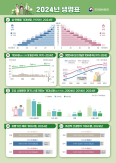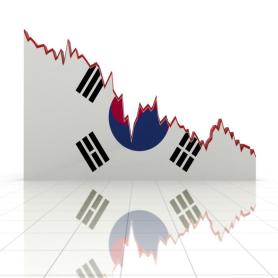
SEOUL, July 12 (AJU PRESS) - Korea must take decisive action to tackle its low birth rates, enhance productivity, and reduce greenhouse gas emissions as the country recovers from the global inflation shock, the Organization for Economic Co-operation and Development (OECD) said Thursday.
In its latest report, the OECD projected the growth of Korea's gross domestic product (GDP) to rebound from 1.4 percent in 2023 to 2.2 percent in 2025, driven by robust exports and resurging demand for computer chips amid the rise of artificial intelligence.
The OECD emphasized the importance of Korea diversifying its trade and value chains to reduce risks associated with geopolitical tensions and supply disruptions. The country heavily relies on imports of crucial products such as oil and minerals for its manufacturing sector.
Inflation is expected to decline from 3.6 percent in 2023 to 2.5 percent in 2024, approaching the central bank's target of 2 percent, which may allow for monetary policy easing later this year.
The Paris-based organization stressed the urgency of addressing Korea's fertility rate, which plummeted to 0.7 children per woman in 2023. "Improving the work-life balance for both genders, closing remaining gaps in family policies, addressing high housing and education costs, and tackling labor market dualism are key to reverse the trend," it pointed out.
To establish a more stable economy and spur growth, the OECD recommended that Korea adopt a more advanced childcare system, expand parental leave to the entire sector, and reinforce measures against workplace discrimination.
Creating an environment that encourages young people to start families is also crucial. The OECD urged Korea to make education and housing more affordable and to implement policies to address labor shortages caused by Korea's rapidly aging society.
Additionally, opening doors to more immigrants could attract high-skilled foreign workers.
The OECD noted that while Korea has the largest share of small-and-medium-sized enterprises (SMEs) among OECD countries, their productivity is significantly lower than that of large companies. The organization suggested that consolidating around 1,600 SME support programs into more coordinated and better-targeted initiatives to increase productivity and remove regulatory barriers to foster fair competition.
Korea, one of the most energy-intensive countries in the OECD, should tighten emissions limits to meet the target of a 40 percent reduction in greenhouse gas emissions by 2030 relative to 2018 levels. The OECD suggests that the country should prioritize improving energy efficiency and implementing market-friendly regulations in the energy sector.
The OECD's recommendations highlight the multifaceted challenges facing Korea and underscore the need for comprehensive policy measures to ensure sustainable economic growth and resilience.
Copyright ⓒ Aju Press All rights reserved.




